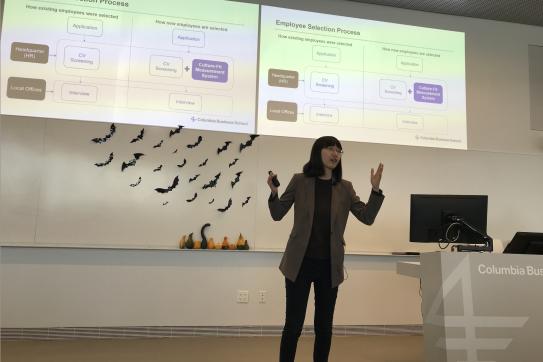As ethical decision-making and a commitment to diversity, equity, and inclusion grow in importance to global businesses, so does the need for research that informs conversations around these topics.
At Columbia Business School’s Reuben Mark Initiative for Organizational Character and Leadership, faculty and PhD students are at the forefront of this research, studying everything from the impact of values on employee performance to company engagement with sociopolitical issues.
At a recent Research Lightning Talks event, presented by the Bernstein Center for Leadership and Ethics and the Reuben Mark Initiative for Organizational Character and Leadership, researchers presented top-line highlights and findings from each project.
Here are three takeaways from the session:
1. “Pre-selecting” employees to shape company culture increases organizational performance.
Increasing employee performance through organizational culture is a common goal for many companies, but the method to do so is not always clear, according to CBS Professor Wei Cai.
Through her research on the employee selection process and organizational values, Cai found that when a large employer hired new employees who are already aligned with the company’s espoused values — using a culture-fit measurement system — those new employees helped influence existing employees to adopt those values, leading to increased performance. Company values used in the research included simplicity, quality, adaptability, and integrity.
The effect was more pronounced in smaller offices when existing employees had shorter tenures and more senior managers were hired via the culture-fit measurement system.
2. Organizations that have dealt with past controversies are more likely to speak out about sociopolitical issues.
In the wake of George Floyd’s murder and the ensuing rise in sociopolitical activism, companies across a wide array of industries were motivated to speak up and participate in social movements. The predictability with which a firm chooses to speak up is the subject of research from CBS Professors Dan Wang and Vanessa Burbano and PhD student Vivi Gregorich.
In their study of the communications of companies throughout the Black Lives Matter and Stop Asian Hate movements, the researchers found companies with more past controversy were more likely to make a statement in support of social movements so people don’t assume their views and they can try to protect their reputation. In contrast, organizations with fewer controversies impacting their public perception had less of an incentive to make such statements.
3. Organizations that publicly promote inclusivity attract more inclusive employees, increasing performance.
When a company fails to be inclusive, it can lead to lower performance, as well as lower employee commitment and well-being. However, organizations can avoid this hurdle by publically making inclusive claims and commitments, especially regarding social issues, which in turn attracts more inclusive job applicants, according to research by CBS PhD student Mike White.
White analyzed 620 young professionals who were randomly assigned to work in small working groups for six weeks. At the end of the study, the participants rated one another on how inclusively they acted. White found people who act most inclusively are more interested in the organizations that make a deep commitment to diversity. Conversely, those who are least inclusive become less interested in working for those organizations.
